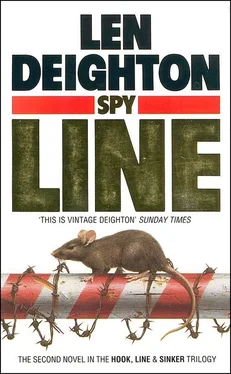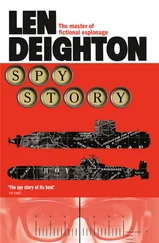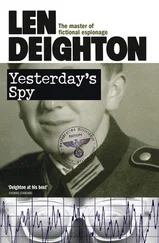Len Deighton - Spy Line
Здесь есть возможность читать онлайн «Len Deighton - Spy Line» — ознакомительный отрывок электронной книги совершенно бесплатно, а после прочтения отрывка купить полную версию. В некоторых случаях можно слушать аудио, скачать через торрент в формате fb2 и присутствует краткое содержание. Жанр: Триллер, на английском языке. Описание произведения, (предисловие) а так же отзывы посетителей доступны на портале библиотеки ЛибКат.
- Название:Spy Line
- Автор:
- Жанр:
- Год:неизвестен
- ISBN:нет данных
- Рейтинг книги:4 / 5. Голосов: 1
-
Избранное:Добавить в избранное
- Отзывы:
-
Ваша оценка:
- 80
- 1
- 2
- 3
- 4
- 5
Spy Line: краткое содержание, описание и аннотация
Предлагаем к чтению аннотацию, описание, краткое содержание или предисловие (зависит от того, что написал сам автор книги «Spy Line»). Если вы не нашли необходимую информацию о книге — напишите в комментариях, мы постараемся отыскать её.
Spy Line — читать онлайн ознакомительный отрывок
Ниже представлен текст книги, разбитый по страницам. Система сохранения места последней прочитанной страницы, позволяет с удобством читать онлайн бесплатно книгу «Spy Line», без необходимости каждый раз заново искать на чём Вы остановились. Поставьте закладку, и сможете в любой момент перейти на страницу, на которой закончили чтение.
Интервал:
Закладка:
This fellow Baron Staiger had none of the merriment I'd seen in Hoffmann in Salzburg. He made no attempt to introduce me to his guests, listlessly addressing those who had noticed our entrance with the words, 'This is Mr Samson, a friend from Salzburg.' I was damp. The heavy rain had penetrated my trenchcoat, and my baggy old suit had creases in all the wrong places. They looked at me without enthusiasm.
In the corner a pianist was wrestling with George Gershwin, and they were both losing. After my entrance he played a few desultory bars of waltztime and then gave a smile as if he knew me. The piano stopped soon after that. I had the feeling that my entrance had spoiled the gemutlich atmosphere.
The waiter bore down. Asked what I'd like to drink, and hearing there was no hard liquor, I took the Gspritzter and stood around waiting for everyone to go home. I could not avoid the impression that Staiger wanted to be distanced from me in every way, for after making sure I had a drink in my hand, he moved to a group on the other side of the room.
'So you live in Salzburg now?' asked someone from behind me. I turned and saw it was the piano player, who in the better light I now realized with a shock was someone I knew.
Jesus H. Christ! It was a malevolent reptile named Theodor Kiss, who preferred to be called Dodo. The last time I'd seen him he was threatening to tear me to pieces and was equipped with the means to do so. Now he smiled sweetly, his long white hair giving him a rather august appearance despite the unpressed dinner suit. He was a vicious old man, a Hungarian who'd changed sides when Germany lost the war and carved a new career with the victors. 'No, do you?' I replied.
' Vienna actually. I have a wonderful new apartment. I decided to move… the south of France has become so… so vulgar.'
'Is that so?' I could see the new red scar tissue across Dodo's scalp: the wound made when Jim Prettyman felled him and probably saved my life.
'And how is my darling Zu?' He was a friend of Gloria's family.
I mumbled something about her being well.
He knew I didn't want to talk with him but he enjoyed persisting. 'I studied in Vienna of course. The city is like a home to me; so many old friends and colleagues.'
I nodded. Yes, indeed: plenty of old colleagues here for a one-time Nazi like Dodo. The waiter offered us a tray with dabs of Liptauer cheese on small shapes of toast. I popped a couple in my mouth. I'd had no food on the plane.
' Vienna is the most beautiful city in the world,' said Dodo. 'And so gemutlich! Do you like the opera?'
I was eventually rescued from the conversation by a man who asked me if I was a newspaper reporter. Dodo moved away. The newcomer was thickset, with a little beard of the sort called a van Dyke, although on him it looked somewhat Mephistophelean. I answered that I wasn't and he seemed content that I shouldn't be. He raised an arm to indicate a large painting: a grotesque arrangement of abstract shapes in primary colours. 'You like it?' he asked.
'What is it?' I said.
'It is modern art,' he said with a patronizing drawl. 'Do you know what that is?'
'Yes. Modern art is what happened when painters stopped looking at girls.'
'Really?' he said coldly. 'Is that not Kulturbolschewismus ? It was a low blow. Cultural Bolshevism was the name the Nazis coined to condemn anything other than the state-approved social realist art.
'I'm getting to like it,' I said in my usual cowardly way. 'Are you a painter?'
'Andras Scolik!' He clicked his heels and bowed from the neck. 'I write music,' he said. 'Viennese music.'
'Waltzes?'
'Waltzes!' he said disdainfully. 'Of course not! Real music!'
'Oh, yes,' I said. I caught the attention of a passing waiter and this time I had local champagne. It tasted just like the Gspritzter .
'No,' he said, 'I didn't write the famous "Yodeler" or shepherd songs like "In the Salzkammergut folk are gay". I hope that doesn't disappoint you too much.'
'No,' I said.
'It is a battle against history,' he said. 'We Austrians do everything to excess, don't we?'
'No,' I said.
'Yes, we do. Foreigners laugh at us. Our national costume is comic, our version of the German language is incomprehensible, our cuisine indigestible, our bureaucracy indomitable. Even our landscape and our climate are absurd and extreme. Mountains and snow! How I hate it all. Ask a foreigner to name a famous Austrian and he says Julie Andrews.'
I was not expecting to arouse such fervour. I tried to calm him down. 'I was thinking of Mozart,' I said hurriedly.
It seemed only to infuriate him more. 'Don't talk to me of Mozart. This damned country is enslaved by his memory. We musicians are prisoners of Mozart and his wretched eighteenth-century music. Tum-titty-turn-titty-tum-tum-tum. I despise Mozart!'
'I thought everyone liked Mozart,' I said.
'The English like him. That anaemic eighteenth-century music suits the bloodless English temperament.'
'Perhaps that's it,' I said, having given up hope of cooling his temper.
'Dead composers! They only like dead composers. When Mozart was alive they seated him with the servants: one place above the cooks but well below the valets. That's what they do to musicians when they are alive.'
'You don't really despise Mozart, do you?' I asked him.
'Tum-titty-tum-titty-tum-tum-tum.'
'Consider,' I said authoritatively, 'the psychological insight, the dramatic integrity and the musical elegance.'
'Rubbish! Why did that foolish boy waste so much time with German operas – toy music – couldn't he see that the future of opera was rooted in the sublime genius of the Italians? Listen to La Traviata . You will hear passion… profound human feelings as expressed by the lush sound of a full-sized orchestra and scored by a composer of real genius who understood the art of singing in a way that little Mozart never could.'
'Andras!' called someone from the other side of the room. 'Could you settle an argument over here?'
The angry musician bowed stiffly from the neck and, spilling a few drops of his wine, took his leave of me with all the formalities. I sipped my drink and looked round. There was a distinct heightening of atmosphere in the room. Instead of that jaded weariness that so often attends the mourners at a dying party, there was a feeling of expectancy, but what was expected I could not guess.
I examined the room. It would seem to have been cleared of some of its furniture in preparation for this gathering. Some faded rectangles on the wall revealed the places from which large pictures had been removed and replaced with smaller ones. Those few items of furniture remaining were choice antiques, inlaid occasional tables and a sideboard of Hepplewhite style. But my attention went to a set-piece at one end of the room. It had obviously been arranged to captivate some rich client. Three lovely chairs designed in the stark and geometrical Secessionist style, and behind them two superb posters by Schiele. I went to get a closer look at the chairs. My reluctant host must have seen me admiring his wares for he was smiling as he came towards me with a bottle of champagne in his hand.
'I hope Andras was not too abusive,' said Staiger. He filled my glass. He seemed reconciled to my gate-crashing his party.
'He was most informative.'
'Are you with the Diplomatic Corps?' This time there was a smile and a twitch of the nose. 'Or is London Central sending us a more subtle type of man these days?' Staiger was a decade younger than me and yet he could get away with such a remark without inciting anger or resentment. Baron Staiger of Vienna, and Herr Hoffman of Salzburg, and God knows what in the other places he went, was provided with more than his full share of that Viennese Zauber that the rest of the world calls schmaltz.
Читать дальшеИнтервал:
Закладка:
Похожие книги на «Spy Line»
Представляем Вашему вниманию похожие книги на «Spy Line» списком для выбора. Мы отобрали схожую по названию и смыслу литературу в надежде предоставить читателям больше вариантов отыскать новые, интересные, ещё непрочитанные произведения.
Обсуждение, отзывы о книге «Spy Line» и просто собственные мнения читателей. Оставьте ваши комментарии, напишите, что Вы думаете о произведении, его смысле или главных героях. Укажите что конкретно понравилось, а что нет, и почему Вы так считаете.












